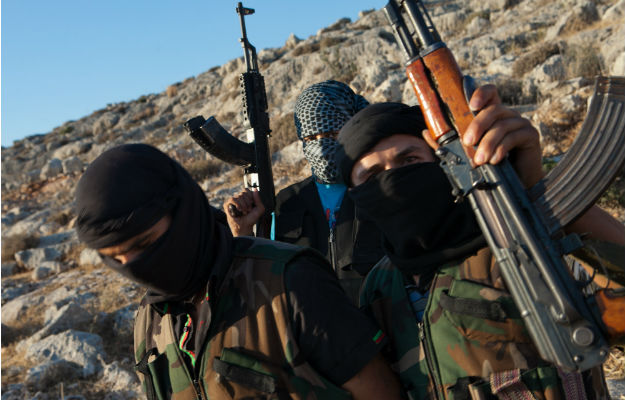
Syria has replaced Pakistan and Somalia as the preferred front line where Islamist volunteers can experience immediate combat with relatively little official scrutiny, security agencies said.
The worrying development has been taking place as extremist groups, some with links to al-Qa’ida, have become the dominant force in the uprising against the Damascus regime.
More than 100 British Muslims are believed to have gone to fight in Syria with the numbers continuing to rise. The situation presents a unique problem for Western security and intelligence services. In Syria, unlike Pakistan and Somalia, they have to keep track of jihadists who are being backed by Britain and its allies.
The Syrian rebels are drawing recruits from a variety of national backgrounds in the UK. Only a handful of those who have returned from the fighting there have been arrested and all for a specific offence: their alleged role in the kidnapping of a British freelance photographer, John Cantlie, in Idlib province last summer. Others who have been taking part in the armed struggle against the Assad regime are not deemed to be doing anything illegal.
Mr Cantlie, along with a Dutch colleague, Jeroen Oerlemans, are believed to have been abducted by a group called al-Dawa al-Islamiyya, which encouraged British and other Western volunteers to join the struggle against the Assad regime. The hostages were rescued by moderate fighters.
Abo Mohamad al-Shami, the leader of al-Dawa al-Islamiyya, was executed five weeks later, supposedly by the Farouq Brigade, a unit of the Free Syrian Army, which had become alarmed at the activities of the extremists.
But since then the Islamists, and in particular one group, Jabhat al-Nusra – which proclaims links with al-Qa’ida and has bee prescribed by the US administration as a terrorist group – have grown in size and influence largely due to supplies of money and arms from backers in Qatar, Saudi Arabia and other states in the Gulf.
It is to counter the growth of the extremists that the British Foreign Secretary William Hague successfully campaigned for a partial easing of European Union sanctions on Syria. The UK will supply armoured cars and body armours to “moderate” rebels.
David Cameron announced earlier this week that if the EU rescinds the easing of the rules, the UK will go ahead with supplying more lethal weapons to the “democratic” opposition.
Security officials point out that the volatility of the strife in Syria, with khatibas (battalions) forming, merging and disbanding, makes it difficult to keep track of whether British jihadists have ended up fighting for so-called moderate groups or extremists.
The Independent has come across revolutionaries who were avowedly “secular” in the past who now declare themselves Islamists. Some do so to get funding from the Gulf states.
The Russian Foreign Minister, Sergei Lavrov, whose government has backed the Assad regime, declared during a visit to London today that any attempt by Britain to arm the rebels would be a violation of international law and strenuously opposed by the Kremlin.
“International law does not permit the supply of arms to non-governmental actors,” he said.
Standing beside him at a press conference, Mr Hague and the Defence Secretary Philip Hammond stated that the UK “had not ruled anything out” in arming the rebels. Mr Lavrov warned weapons may fall into the hands of extremists.
“We don’t know who is going to receive the arms, how they are going to use them. The most dangerous and effective group fighting the regime is the Jabhat al-Nusra which we note the US has declared a terrorist organisation,” the Russian Foreign Minister said.
0 comments:
Post a Comment
Add your comments